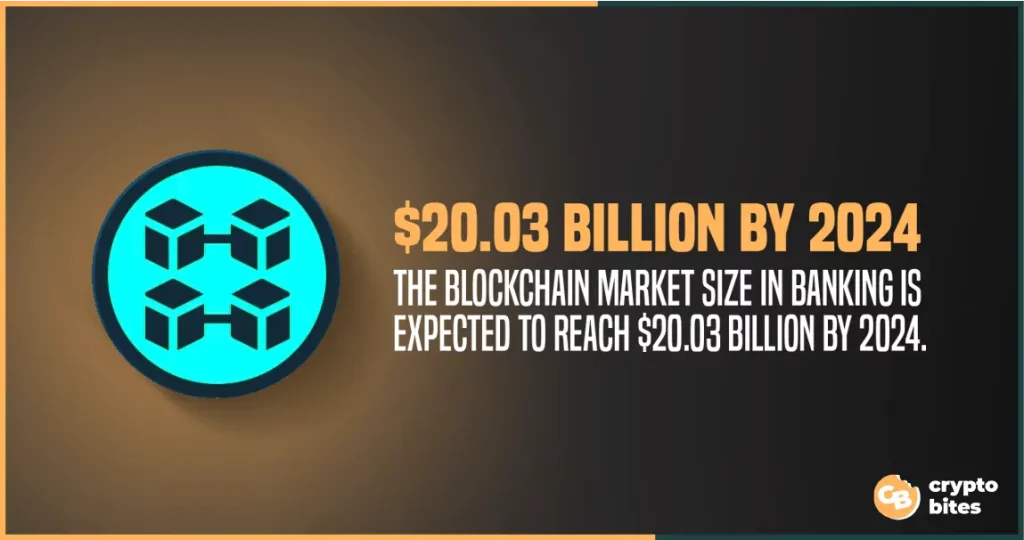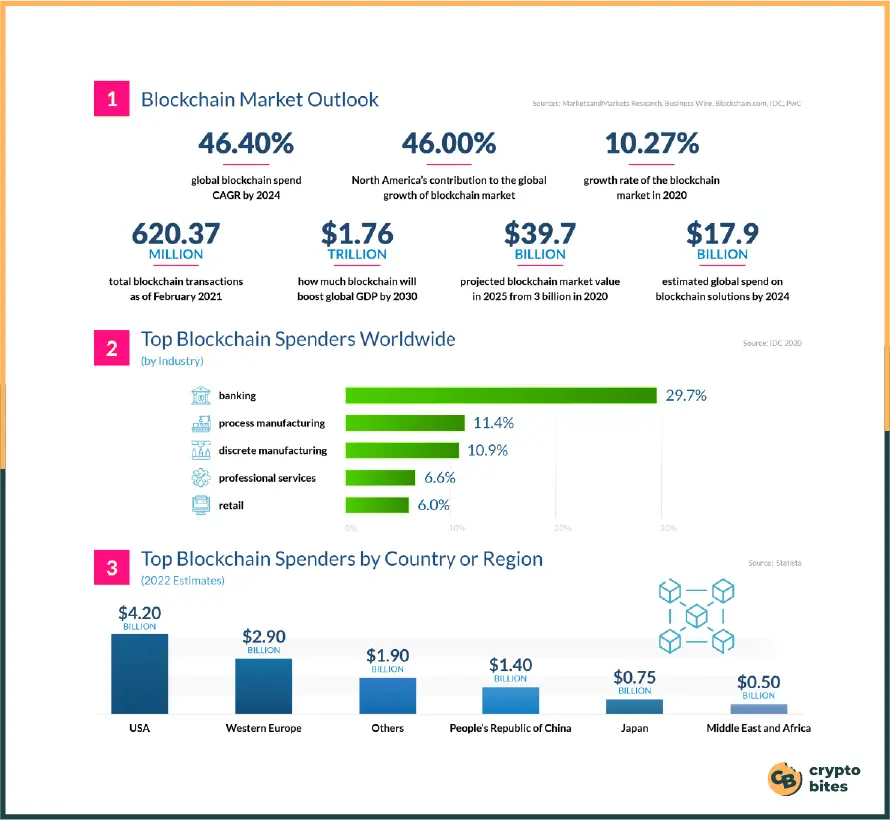
Future of Blockchain – Upcoming Trends To Watch Out For!
Right now, there are people all over the world working on new ways to use blockchain to change how businesses work.
This is happening in almost every industry and in many different places around the world.
Basically, things are changing in how we do business.
You might have heard people talking a lot about blockchain lately.
The important thing to know is that blockchain is what makes cryptocurrencies work.
Lots of different industries are using technology for all sorts of things these days.
Still wondering what blockchain is?
It’s basically a digital record-keeper that’s super secure and can’t be changed, keeping track of transactions forever.
The size of the global blockchain market was about $4.67 billion in 2021.
Experts think it could reach $163.83 billion by 2029.
That’s a huge jump and shows how fast this technology is growing.
This article will tell you more about where blockchain is heading and what its market might look like in the future.
Blockchain and The Importance of Killer Apps
When IBM-compatible personal computers (PCs) came out, it was Lotus 1-2-3 that made buying them worthwhile.
The PC was good, but it really took off when it became necessary for running 1-2-3.
Microsoft Windows brought many new things to PC users in the 1980s, but its future was uncertain until Microsoft Office came along—a set of useful tools that only worked with Windows.
A bit later, Bill Gates, the founder of Microsoft, saw the internet browser as the key feature for Windows 95’s success.
The future of blockchain might follow a similar path.
Blockchain is like the early PCs, the IBM PC, or Microsoft Windows—it’s a foundational technology.
For blockchain to reach its full potential, it needs to become the basis for an app or service that many people want to use—a game-changer.
Why is blockchain important?
Because it powers an app or service that people can’t resist—a game-changer.
Blockchain is closely tied to Bitcoin and other cryptocurrencies.
Most people using blockchain today do it to buy or sell cryptocurrencies.
For them, crypto is what makes blockchain valuable.
But many people haven’t gotten into crypto yet, and the idea of using Bitcoin for everyday purchases seems far off.
Cryptocurrency alone isn’t enough for blockchain to reach its full potential.
If that’s all blockchain is good for, it won’t become a mainstream technology.
Blockchain Technology’s Future in 2024
You’ve probably heard about blockchain getting more popular.
But did you know it’s also starting to change how businesses do things?
Actually, a lot of industries are realizing that blockchain might be a better way to do important parts of their work.
Let’s take a look at some industries that are really going to feel the impact as more people start using blockchain.
Blockchain in Banking
Imagine you send $100 to your friend using a regular bank.
The bank takes a $10 fee, so your friend only gets $90.
If she’s in another country, she might get even less because of extra fees.
This whole process is slow, costly, and not always completely safe.
Now, let’s talk about blockchain.
Blockchain shakes up the traditional banking system by offering a direct payment method with tight security and low fees.

There’s no big bank in charge, so you don’t have to pay extra fees to anyone. Pretty neat, right?
This means you can make transactions directly using cryptocurrencies like Bitcoin without needing a middleman.
When you send money to your friend using blockchain, it’s recorded in a ledger that all cryptocurrency users can see, giving you full control over your transaction.
This is already in use, with apps such as Abra that allow peer-to-peer money transfers.
Blockchain in Finance
The future of blockchain in finance looks promising.
Money transfers between different parties can be really expensive.
But with blockchain, we can cut out the middlemen and make transfers cheaper.
Blockchain also gives finance a clear record-keeping system.

This makes it easier for authorities to see where money is coming from and going.
It’s a good way to stop illegal money movements.
Blockchain can also automate financial tasks.
Banks can use it to make smart contracts, which are like agreements that enforce themselves.
These contracts can cover things like paying for goods or services without needing a person to oversee them.
With blockchain, it’s also easy to track things like real estate or gold.
Automated systems help make sure who owns what.
And it’s handy for verifying loans, contracts, and other important documents too.
Blockchain in Cybersecurity and Networking
One way people think blockchain could help in the future is by making things safer online, especially when it comes to cybersecurity and networking.
With more and more cyberattacks happening, businesses everywhere are worried.
These attacks often mess with data and can really hurt a company’s reputation.
Remember when Equifax had that huge data breach in 2017? It affected millions of people.
But blockchain might be able to stop stuff like that from happening.
It can keep our data safe from sneaky people trying to get in and mess things up.
Lots of companies still keep all their important stuff in one place, which makes it easy for hackers to get in and cause trouble.
But if they used blockchain, it could stop those kinds of attacks.
Using blockchain can also keep private messages safe from prying eyes.
And it can help fight against DDOS attacks, which slow down or crash systems by flooding them with requests.
If more systems used blockchain, it could make DDOS attacks less effective.
Blockchain in Cloud Storage
In the future, blockchain can be widely used for cloud storage.
Cloud platforms with centralized servers carry risks like data loss, hacking, and human errors.
These platforms are often vulnerable to unauthorized access due to their extensive exposure.
Cloud computing complexities make it easier for attackers to find weaknesses and access sensitive information.
The main issue with traditional cloud storage is its reliance on a single point of failure.
An effective solution to this problem is incorporating blockchain technology.
In blockchain, files are spread across multiple computers on a decentralized network, eliminating a single point of failure.
If data is lost on one computer, it can be easily recovered from others in the network.
This prevents data loss and ensures smooth business operations.
Blockchain in IoT
Blockchain technology has a promising future in the Internet of Things (IoT).
Big companies like IBM and Samsung are quickly getting on board with this technology to build networks of IoT devices.
Their main goal is to get rid of centralized hubs that manage communication between devices for things like fixing errors and updating software.
Blockchain can create mesh networks for the IoT.
This means the devices can connect to each other more securely.
It’s a great way to stop things like impersonation and device spoofing.
Using blockchain with IoT can benefit lots of industries.
For example, it can make logistics, supply chains, and insurance run smoother because they all depend on each other.
Blockchain in Digital Advertising
Looking ahead, blockchain technology holds promise for digital advertising.
In the world of digital advertising, businesses deal with several challenges today.
Issues like not knowing where the money is going, fake online traffic, payment problems, fraud, and more can be tough.
But here’s where blockchain steps in to lend a hand.
Because it’s trustworthy and clear, blockchain tackles problems in how ads are sent out and paid for.
With this technology, handling transactions related to ads becomes simpler.
Supply Chain Management
In the supply chain, we often worry about mistakes and delays caused by people.
Blockchain technology can help solve these problems and make the supply chain work better.
With blockchain, you can keep a close eye on costs, employment, and shipments at each stage of the supply chain.
The traceability of blockchain makes it simple to make sure products are real and that trade is fair.
It also stops businesses from losing money to fake or illegal products and keeps their reputation safe.
Government
Blockchain has a big role to play in the future for governments.
It can help them manage and protect huge amounts of data.
This means better handling of data and keeping sensitive information safe from theft and fraud.
Another thing we might see in the future is governments creating their own digital currencies.
They could use blockchain to make and manage these digital currencies and even get involved in the market.
Bottom Line
The need for blockchain technology is growing, and it won’t slow down anytime soon.
In fact, it’s expected to increase even more soon.
Businesses are catching on to the advantages of blockchain and are quickly starting to use it.
This technology doesn’t just make data more secure and private; it also makes business operations smoother and more efficient.
It’s useful in many industries, like finance, advertising, supply chain management, cybersecurity, and more.
Even government agencies can find benefits in using blockchain.
This limitless potential and early interest and adoption only goes to show that more blockchain trends will follow in the coming years.




